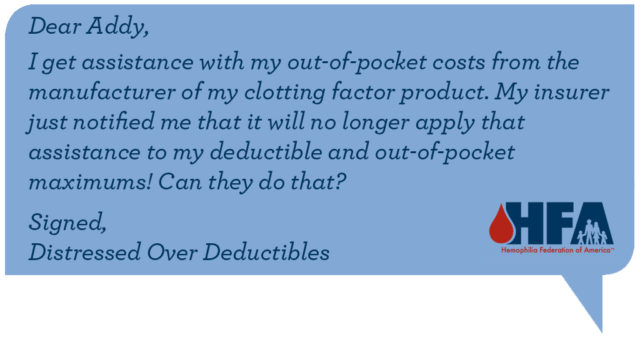
Dear Addy,
I get assistance with my out-of-pocket costs from the manufacturer of my clotting factor product. My insurer just notified me that it will no longer apply that assistance to my deductible and out-of-pocket maximums! Can they do that?
Signed,
Distressed Over Deductibles
Dear Deductibles,
You are running up against a new strategy that Pharmacy Benefit Managers (PBMs) are starting to implement around the country, called “accumulator adjuster programs” (AAPs). The problems created by AAPs, unfortunately, are confronting a growing number in the bleeding disorders community.
AAPs are programs that PBMs provide, mostly to large self-insured employers, and that apply to patients who use drug co-pay cards and other forms of manufacturer co-pay assistance. Under an Accumulator Adjuster Program, a PBM accepts co-pay assistance for out-of-pocket costs associated with a prescribed drug but then doesn’t credit that amount toward the patient’s overall deductible. This means that patients with chronic and expensive disorders will still be required to personally pay deductibles, co-pays, and other out-of-pocket expenses up to the yearly out-of-pocket maximum, even as the health plan draws down the full amount of the co-pay card.
AAPs are most often implemented in self-funded employer plans that have high deductibles, leaving enrollees on the hook for large yearly out-of-pocket outlays. The Integrated Benefits Institute (IBI), a non-profit that evaluates health benefits for employers, has warned employers against implementing these plans. The IBI notes that research shows when health plan enrollees face higher cost sharing for their medications, they stop adhering to their prescribed plan of treatment. This nonadherence can lead to worse health outcomes and higher demand for health services, including ER visits and hospitalization. Regrettably, some PBMs and some employers are choosing to disregard this advice.
AAPs leave people who live with expensive chronic conditions, like bleeding disorders, in a tough financial bind. If you find yourself in this situation, please check out the options listed in HFA’s Resource Library: Navigating Patient Assistance Programs, or reach out to HFA directly. You may also want to see if your specialty pharmacy provider can suggest any sources of assistance. HFA recently learned of a new patient assistance fund that may be able to help with expenses if you are faced with an AAP.
HFA is working to educate health plans and PBMs about the dangers posed by AAPs. If you have received a letter from your employer or benefit manager stating that your co-pay cards will no longer be applied to your deductible, HFA needs to hear from you. Please share your story with Project CALLS. Collecting data about these issues is the only way to fight their implementation!
Sincerely,
Addy
Have a question? Click HERE. Your name will be changed in the response.
HFA frequently receives questions from the bleeding disorders community related to advocacy issues. The questions often impact the entire community. In an effort to reach the largest audience possible with our responses to these widely applicable questions, HFA developed “Dear Addy.” Questions submitted to this column are edited in order to protect privacy and should be considered educational only, not individual guidance



